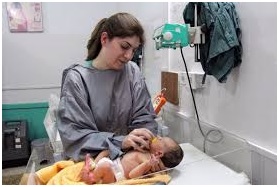Technology and greater investment key to boosting women's reproductive health : Experts
As the coronavirus disease has taken the centre stage with the spread of new strains of the virus and vaccinations is the conversation taking place in our daily lives. Other health services particularly the family planning issue, was one of the most adversely impacted due to the pandemic, inform experts.

Expressing concerns a panel of experts on the occasion of World Population Day, spoke about ‘Addressing Women's and Girls' Needs for Sexual and Reproductive Health and Family Planning Services during COVID-19 and Beyond’. The panel experts deliberated on a range of population-related issues including, family planning, gender equality, maternal health and transforming social norms, organized by Population Foundation of India.
India’s population is stabilizing with Total Fertility Rate (TFR) declining to 2.2, which is almost within reach of the TFR goal of 2.1 as envisaged by Government of India’s Population Policy, 2000. The National Family Health Survey, NFHS-5 (Phase-I, 2019-20) reported an increase in the uptake of modern contraceptives in all 17 states that were surveyed, while unmet need for family planning declined in most states.
Talking about leveraging digital technology, Dr SK Sikdar, Advisor, Maternal Health and Family Planning, MoHFW emphasized that the Government of India prioritized family planning as an essential health service during the COVID-19 emergency and by leveraging digital technology.
He also reiterated the need for attention to increase male engagement, “to reach gender and health goals we must focus on men and boys and encourage an open and inclusive dialogue on sexual and reproductive health.”
Sharing the opening remarks, Dr Kiran Mazumdar Shaw, Founder and Executive Chairperson, Biocon Ltd, said,“COVID-19 has exposed health and gender inequities and inequalities in India.” She mentioned the need for digital technologies to provide sexual and reproductive health information to young people and to build skills of healthcare workers to provide evidence-based health care.
“Investing in primary healthcare can play an essential role in improving the health of women, mothers and infants for survival and sustainable future," she added.
Focusing on family planning, Martyn Smith, Interim Executive Director and Managing Director, FP2030 said, “COVID-19 is giving us the opportunity to talk about equity issues more intensely. When we understand the fragility of our health system, we can better devise our ability to respond realistically.”
Stressing on the need continue to innovate and use technology to improve health services and challenge social norms Archna Vyas, Deputy Director, Program Advocacy, Communications and Behavioural Insights from Bill & Melinda Gates Foundation (BMGF) informed that technology can be a critical tool to improve access to health services for vulnerable populations.
Applauding the innovations introduced by several state governments during the past year, Argentina Matavel, Resident Representative India, and Country Director, Bhutan, UNFPA, said, “This is the time for innovations and use of digital technology to serve the underserved. This is the time for acceleration, to bring services closer to home."
Mentioning the importance of upholding women’s rights and choices, Matavel added, “Women will respond with reason to whatever is before them and when you put rights and choices, including availability of a wide basket of contraceptive methods and information, to the forefront women will respond to reason.”
Moderating the panel, Poonam Muttreja, Executive Director, Population Foundation of India, said, “To fully leverage our advantage, we must safeguard women and young people’s health, rights and wellbeing. Coercive population policies, which impose restrictions on the number of children couples can have, fail to acknowledge that India has nearly achieved replacement level total fertility rate. This means that now is the time to protect, equip and empower our population to ensure no individual is left behind as we evolve into a nation with a dynamic, young and productive population.”
